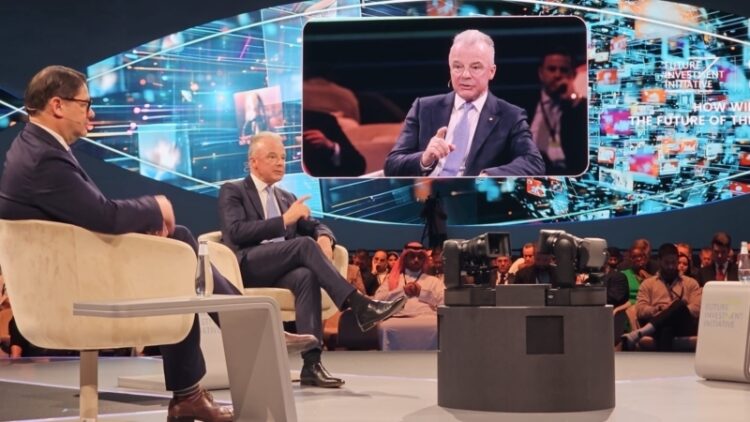Publisher: Maaal International Media Company
License: 465734
Boeing Global President to (Maaal): We have a backlog of orders for more than 730 aircraft from Saudi Arabia, Qatar and the Emirates.. Boeing in talks to develop aluminum industry in the Kingdom
In an exclusive interview with “Maaal Newspaper”, Dr. Brendan Nelson, President of Boeing Global, revealed his optimism about the future of the aviation sector, in the Middle East and the Kingdom in particular. According to Nelson, the global passenger and cargo fleet will double over the next two decades, and demand for new commercial aircraft in the Middle East alone is expected to exceed 3,000 aircraft, 45% of which are wide-body aircraft, the highest percentage globally. He confirmed that the regional backlog of orders currently stands at more than 730 aircraft, including orders from major airlines such as Saudi Airlines, Riyadh Airlines, Emirates Airlines and Qatar Airways, highlighting the huge potential for growth in this market.
During the dialogue, the Boeing CEO spoke about Vision 2030 and its role in strengthening Saudi Arabia’s position as a regional and global aviation power, as it aims to serve 330 million passengers annually and attract 150 million visitors by 2030, explaining that Boeing is working on pioneering projects in Saudi Arabia, including delivering 39 aircraft to Riyadh Aviation in the first quarter of 2025, expanding cooperation in the field of defense and localizing industries, in addition to integrating metal components manufactured in Saudi Arabia into aircraft manufacturing operations.
The Boeing Global President touched on new aircraft orders from the Gulf and Asia, the company’s strategies to overcome manufacturing challenges and enhance production safety, in addition to developments in the field of fuel efficiency and reducing carbon emissions.
اقرأ المزيد
Text of the dialogue
*What are your expectations for the aviation market over the next three years in terms of growth, sales and new markets?
– I am optimistic about the future of the aviation market, especially in the Middle East and Saudi Arabia. According to Boeing’s Commercial Market Forecast, the global passenger and freight fleet is set to nearly double over the next 20 years, with airlines expected to take delivery of 44,000 new airplanes by 2043.
In the Middle East alone, we expect demand for more than 3,000 new commercial airplanes, with widebodies accounting for 45% of these deliveries – the highest proportion among global regions. The region’s single-aisle fleet is also set to double, supported by the expansion of low-cost carriers and short-haul networks.
We have a healthy regional backlog of more than 730 aircraft from major airlines such as Saudia, Riyadh Air, Emirates and Qatar Airways, underscoring the strong growth potential in this market.
Crown Prince Mohammed bin Salman’s Vision 2030 for a vibrant, innovative and technology-rich Kingdom and the Kingdom’s ambitious goal of serving 330 million passengers and attracting 150 million visitors annually by 2030 will open up additional new opportunities. Aviation is one of the world’s greatest economic drivers, and Boeing is proud to contribute to the Kingdom’s efforts to strengthen its position as a key player in advancing aviation innovation regionally and globally.
*Do you have any new aircraft orders from Gulf and Asian countries? What are the volumes?
– Recent orders from the region highlight the continued growth in air cargo demand year-on-year, as well as the growing need for advanced, efficient and sustainable aircraft. In October, Emirates SkyCargo placed an order for five 777 Freighters, bringing its total order book to 249 Boeing widebody airplanes, including 14 777 Freighters.
In July 2024, Turkish Airlines placed a significant order for four 777 Freighters, expanding its fleet to 12 of these airplanes. The 777 Freighter remains Boeing’s best-selling freighter of all time, with more than 265 deliveries.
Additionally, in July, Qatar Airways ordered an additional 20 777-9 passenger airplanes, bringing its total order to 60. It played a key role in launching the 777X program and is the launch customer for the 777-8 Freighter, with 34 Next-Generation Freighters on order. We remain very proud of the orders from Saudi Arabian Airlines and Riyadh Air, which are due to start in March 2023, for up to 121 Dreamliners. This order represents the fifth largest order by value in Boeing’s history and will support the Kingdom’s broader strategic plan to transform the country into a global aviation hub.
*What is the size and number of Boeing projects in the Kingdom? Are there any discussions about new projects, especially with the Kingdom’s desire to develop and localize defense systems?
– Boeing has enjoyed an 80-year partnership with Saudi Arabia that has allowed us to establish a strong presence in the Kingdom. Our long-standing relationship with the Royal Saudi Air Force began in 1978 with the purchase of the Kingdom’s initial fleet of F-15C/D aircraft, and since then we have delivered more than 400 defense aircraft. We are proud to support the Royal Saudi Air Force fleet, which includes Boeing F-15SA fighters, AH-64E Apache and AH-6 attack helicopters, CH-47 Chinook heavy-lift helicopters, E-3A AWACS aircraft, KC-3A cargo/refueling aircraft, and ScanEagle systems.
– Boeing is poised to continue supporting its long-standing and valued customers in the Kingdom with the most capable air superiority aircraft in production today so they can meet their current and future defense needs. For example, the F-15EX will add critical capabilities to the Saudi Air Force as the country seeks to accelerate the modernization of its armed forces.
Boeing’s localization strategy in the Kingdom prioritizes sustainable manufacturing, integration into global supply chains, and expanding local support. By leveraging partnerships with leading defense companies, we are committed to incorporating advanced technologies that not only enhance operational effectiveness but also strengthen global supply chains.
We are actively engaged in discussions related to the Kingdom’s desire to develop and localize defense systems, and we have a proven track record of executing industrial projects that support this goal. A notable example is the establishment of the Saudi Rotorcraft Support Company (SRSC), which has opened up numerous commercial opportunities in helicopter maintenance, repair, and overhaul, not only in Saudi Arabia but also regionally.
Another example is the Decision Support Center we established at King Abdulaziz City for Science and Technology in Riyadh, which the Saudi Armed Forces use to model the deployment of existing and new capabilities, all run by Saudi software engineers. In addition, we have partnered with three leading Saudi universities – Alfaisal University, Princess Noura University, and King Abdullah University of Science and Technology – to enhance educational and research opportunities.
Most recently, we signed a Memorandum of Understanding with Bahri Logistics to explore collaboration in supply chain and distribution. Together, we aim to contribute to the growth of the Kingdom’s defense capabilities and drive progress in the aviation sector by leveraging the Special Integrated Logistics Zone.
*You previously committed to integrating Saudi-made metal components into aircraft manufacturing. How has this project progressed?
– We have signed a non-binding agreement with the Ministry of Investment and Ma’aden to explore ways to enhance the Kingdom’s aluminum manufacturing capabilities. We are now actively working towards finalizing a formal agreement, which will support Saudi Arabia’s goal of becoming a global leader in the manufacturing of aerospace aluminum – one of the most widely used materials in aircraft construction.
*You have entered into an investment cooperation agreement with the National Manufacturing Company (Tasnee) to develop a titanium supply chain for the aerospace industry in the Kingdom. Tell us about the developments of the project?
– Boeing is collaborating with Tasnee and the Public Investment Fund (PIF) and is engaged in discussions to initiate a vision study focused on titanium. This study aims to enhance our understanding of titanium production and supply chain while exploring opportunities for collaboration within this vital materials sector for aircraft manufacturing.
– Boeing is committed to delivering 39 new aircraft to Riyadh Aviation in the first quarter of 2025. Are you on track to implement the specified schedule, or are there any adjustments? Will the 39 aircraft be delivered in one go or in stages?
– We are proud that Riyadh Aviation, the newest airline in the Kingdom, has placed an order for 39 Boeing 787-9 aircraft in March 2023, with an option to purchase 33 more aircraft. We look forward to building on this partnership and supporting the Kingdom’s goal of serving 330 million passengers and attracting 150 million visitors annually by 2030.
*Boeing has faced challenges in manufacturing and safety systems recently, can you give us a summary of the company’s latest developments in this regard, and have these challenges impacted your market share?
– We are implementing a comprehensive strategy aimed at addressing our financial challenges while strengthening quality control and preventing future issues. A key aspect of this strategy is changing the culture within the organization. We recognize that culture is driven by values, and we are committed to redefining these values. This includes integrating our leaders more closely with the business; we believe it is essential for them to be present on the factory floor to understand operations firsthand.
In addition, we are focusing on preventing problems from escalating and fostering better collaboration across teams. This will be supported by a more detailed business rhythm that encourages open communication and proactive problem solving.
Ending the workers’ strike is essential, and we are actively implementing our safety and quality plan. We also need to manage our balance sheet effectively to support maintaining our investment grade credit rating.
Boeing on Monday announced a $21 billion capital increase, including $16 billion of common stock and $5 billion of mandatorily convertible preferred stock. This action is one of several prudent steps in our comprehensive plan to restore our balance sheet and provide the liquidity needed to navigate our current environment and also support our broader recovery as we stabilize the business, improve performance and build a strong future for Boeing.
*What are the latest technologies Boeing is using to improve fuel efficiency and reduce carbon emissions?
Air travel connects people, cultures and businesses, providing essential services such as disaster relief and delivering medical supplies to remote areas. In addition, it plays a vital role in facilitating international trade and tourism.
But we must preserve the benefits of aviation while working as hard as possible to reduce its environmental impact.
Boeing is committed to addressing this challenge through several innovative strategies aimed at achieving net zero emissions. Fleet renewal is one of the most important paths. Each new generation of airplanes reduces fuel use and emissions by 15-25 percent. Full deployment of the latest generation of airplanes represents the largest contribution to CO2 reductions we can achieve over the next decade.
Enhancing operational efficiency through digital tools is another critical area, along with the development of airplanes that use advanced technologies, including hydrogen and electric propulsion, as well as new aerodynamic designs.
When it comes to renewable energy, switching to sustainable aviation fuel (SAF) is one of the most effective ways to reduce aviation industry emissions. Sustainable aviation fuel can reduce carbon emissions over its life cycle by up to 85% and is compatible with existing infrastructure. Currently, it can be blended with regular jet fuel at a rate of up to 50%, works seamlessly with today’s aircraft and requires no changes to fuel infrastructure.









